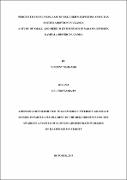| dc.description.abstract | The study examined the effect of perceived usefulness, perceived ease of use and user’s expertise on e-tax system adoption by SMEs in Nakawa division. The study specifically, examined the effect of perceived usefulness on e-tax system adoption, assessed the effect of perceived ease of use on e-tax system adoption and the effect of the moderating factor of user’s expertise on the relationship between usefulness and ease of use of e-tax system adoption. A Technology Acceptance Model was used as the conceptual basis for this investigation. A cross-sectional study design was utilized in the study, where the study population comprised of SMEs in Nakawa division. Purposive sampling design was used to obtain a sample size of 132 SME s but only 90 SMEs were included in the study for the quantitative data. For qualitative simple random sampling design was utilized. All the relationships that is, between perceived usefulness, perceived ease of use, user’s expertise, and e-tax system adoption were tested and found to be significant and positive except for user’s expertise that had a negative relationship. Regression analysis revealed that perceived usefulness was a strong predictor of e-tax system adoption as compared to perceived ease of use. The results revealed that perceived usefulness was the most significant determinant of e-tax system adoption (Beta= 0.374, sig=0.000). Perceived ease of use was also significant (Beta= 0.258, sig= 0.010). However, the moderating factor of user’s expertise was not significant in influencing the e-tax system adoption (Beta=0.035, sig= 0.725). The findings of the study revealed that a system will be adopted if it is regarded as useful, easy to use irrespective of having the expertise in using the system, provided that the use of the system is perceived to offer direct benefits to the user. It should be eminent therefore, that factors which influence technology vary. That is to say, what influences technology acceptance in one region or organization may not necessarily be the same in all cases. Therefore, the e-tax system designers and developers should enhance perceived usefulness either by adding new functional capabilities to the system, or by making it easier. This is to increase on the frequency of usage and rate of adoption of e-tax system. | en_US |

